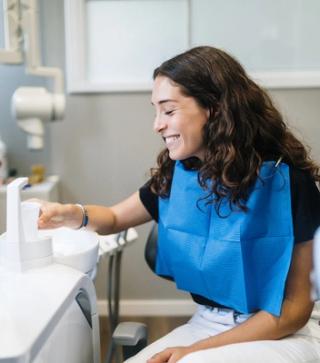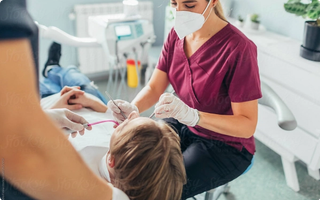Regular Check-Up
Ensure your oral health with a routine dental check-up to maintain a healthy, happy smile.

A visit to the dentist every 6 months is one of the easiest ways to keep your health and wellbeing on track, so we do all we can to make it affordable for everyone to stay up-to-date.
Having a routine dental check-up comes with many benefits and helps prevent things such as tooth decay, migraines, cavities, and even sleep apnoea! Not only does routine teeth cleaning from your dentist help you maintain good oral health, but it brings back confidence in your smile. If you haven't been scheduling your regular dental check-ups, now is the perfect time to start.
What to expect from a dental check-up
We are a friendly bunch that will be with you whether you're returning as you haven't seen a dentist in a while or hunting for a new dental clinic; every regular dental check-up is similar. You want somebody friendly who makes your health a priority, and who is easy to understand when it comes to explaining exactly what they're doing.
With your visit to your dentist, you can expect the following things:
- A thorough inspection of your mouth to check for potential cavities, issues with your gum line (possible gum disease), tooth decay, and more.
- X-rays to provide a better view of your teeth, jaws, and the overall condition of your mouth.
- A professional dental cleaning, which will include a thorough scale and flossing of the teeth. This will also help to determine the general dental health of your gums and teeth. If the cleaning is uncomfortable, or your mouth is sensitive at the time, your dentist may prescribe a special toothpaste.
- A chance to discuss any concerns or problems you've been facing with your dentist, such as bad breath or bleeding gums.

Once you've finished with your check-up and teeth cleaning process, most dentists will recommend scheduling another visit to maintain a routine check-in. Should there be any concerns, they may schedule a dental appointment sooner to address them or keep a better eye on your overall oral health.
At the end of the visit, they'll encourage you to floss and brush your teeth twice a day to ensure you're implementing healthy routines.
Why check-ups are important
Dentists recommend having a check-up and clean twice a year. A regular check-up every 6-months is the best way to maintain a great smile, spot any potential issues, and treat them before they become a problem.
Using your dental extras is a great way to maintain your oral health, and boost your wellbeing, without paying out-of-pocket costs - check with your health fund provider to see what you're covered for.

It is never too late to take care of your wellbeing
We understand that it may be scary to visit the dentist or it may have been some time. We don’t judge. We are here to provide an expert helping hand to get you back in good health, as you only get one set of teeth, so let's keep you smiling.
If you are a health fund member, there are extra perks saving you money, but we also don’t want to forget about those who don’t have health coverage - we've got you covered, too - with our new patient offer.
Get in touch with our friendly team to schedule your appointment.
Frequently asked questions
Most people should have a dental check-up twice per year. This is in order for your dentist to keep an eye on your dental health, prevent issues from occurring, and treat any problems that arise immediately.
If you are having issues such as dental pain and wish to be seen sooner, don’t hesitate to make a booking with your dentist as soon as possible.
In Australia, the cost of a regular dental check-up will vary based on a number of factors.
Typically, a check-up will include an oral exam, x-rays, and cleaning from a dental hygienist. Your appointment may cost more if you require additional services, or less if you don’t need all of the above.
Most private health insurance companies will provide some level of rebate for dental check-ups, as they are considered preventative treatments. Check with your health fund provider, as you may be entitled to at least one gap-free check-up per year.
Your first dental check-up will typically be 45 minutes to an hour, as this includes your dentist taking a set of x-rays, doing an oral exam, and a professional clean.
A check-up with your regular dentist will typically be 30-45 minutes.
No, your dental cleaning should not be painful.
During the cleaning, your practitioner will floss and polish your teeth, and use a descaler to remove any built-up plaque. While some of these steps may feel a little uncomfortable, you can ask to pause at any time.
If you do experience pain during cleaning, let your dentist know, and they can investigate the issue.
During your regular dental check-up, your dentist will scrape off any plaque that has built up on your teeth. This sticky substance is made from bacteria and forms on your teeth constantly, which is why it’s important to brush and floss daily to remove it. However, plaque often ends up building up, especially in places that are difficult to reach with your brush.
Plaque is the cause of numerous dental issues, including teeth discolouration, bad breath, and gum disease. If untreated, it can even lead to periodontitis, which can result in the loss of teeth.
Once plaque builds up, it is too stubborn to remove with a regular toothbrush, which is why a dentist will scrape it off during your check-up. This helps to keep your teeth and gums as healthy as possible.
Your dentist will also offer advice on how to avoid plaque from accumulating in between appointments.

